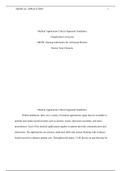Samenvatting
Summary of course - Brazil: Democracy, Citizenship and Culture
This lecture and seminar summary provides a detailed overview of information provided in the lectures of the course; with all the information provided by the lecturer and offers major insights needed for the exam. The course is taken in the minor for Latin American Studies
[Meer zien]






